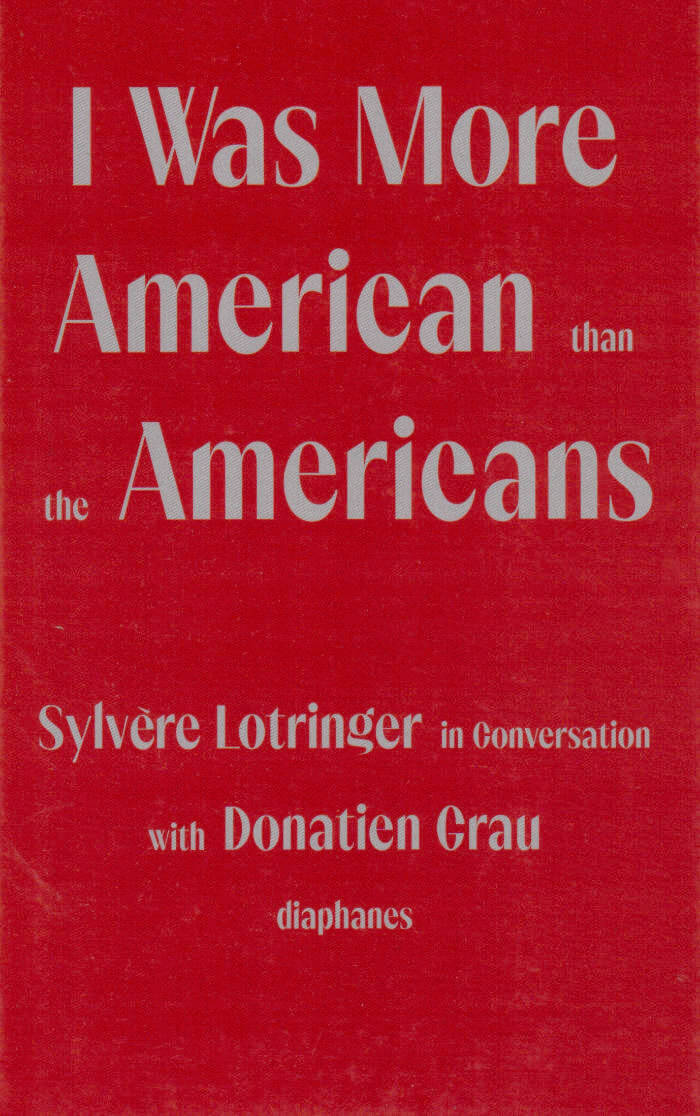Sylvère Lotringer
Sylvère Lotringer

Schizo-Culture: The Event, The Book
Sylvère Lotringer, David Morris
The legendary 1975 "Schizo-Culture" conference, conceived by the early Semiotext(e) collective, began as an attempt to introduce the then-unknown radical philosophies of post-'68 France to the American avant-garde. The event featured a series of seminal papers, from Deleuze's first presentation of the concept of the "rhizome" to Foucault's introduction of his History of Sexuality project. The conference was equally important on a political level, and brought together a diverse group of activists, thinkers, patients, and ex-cons in order to address the challenge of penal and psychiatric institutions. The combination proved to be explosive, but amid the fighting and confusion "Schizo-Culture" revealed deep ruptures in left politics, French thought, and American culture.
The "Schizo-Culture" issue of the Semiotext(e) journal came three years later. Designed by a group of artists and filmmakers including Kathryn Bigelow and Denise Green, it documented the chaotic creativity of an emerging downtown New York scene, and offered interviews with artists, theorists, writers, and No Wave and pre-punk musicians together with new texts from Deleuze, Foucault, R. D. Laing, and other conference participants.
This slip-cased edition includes The Book: 1978, a facsimile reproduction of the original Schizo-Culture publication; and The Event: 1975, a previously unpublished and comprehensive record of the conference that set it all off. It assembles many previously unpublished texts, including a detailed selection of interviews reconstructing the events, and features Félix Guattari, William Burroughs, Kathy Acker, Michel Foucault, Sylvère Lotringer, Guy Hocquenghem, Gilles Deleuze, John Rajchman, Robert Wilson, Joel Kovel, Jack Smith, Jean-François Lyotard, Ti-Grace Atkinson, François Peraldi, and John Cage.

Ce que Sylvère Lotringer n'écrivait pas
François Piron, François Aubart and 1 more
A book of interviews with Sylvère Lotringer.
French philosopher Sylvère Lotringer (1938-2021) was the general editor of Semiotext(e). A younger contemporary of Gilles Deleuze, Félix Guattari, Jean Baudrillard, Paul Virilio and Michel Foucault, he was one of the main introducers and interpreters of French Theory in the United States. He is the author of Overexposed: Perverting Perversions (Semiotext(e), 2007).
François Aubart is an art critic, independent curator and publisher (co-founder of <o> future <o> and Même pas l'hiver).

I Was More American than the Americans
Sylvère Lotringer, Donatien Grau
A personal take on French Theory by one of the people who invented it.
In the mid-1970s, Sylvère Lotringer created Semiotext(e), a philosophical group that became a magazine and then a publishing house. Since its creation, Semio-text(e) has been a place of stimulating dialogue between artists and philosophers, and for the past fifty years, much of American artistic and intellectual life has depended on it. The model of the journal and the publishing house revolves around the notion of the collective, and Lotringer has rarely shared his personal journey: his existence as a hidden child during World War II; the liberating and then traumatic experience of the collective in the kibbutz; his Parisian activism in the 1960s; his time of wandering, that took him, by way of Istanbul, to the United States; and then, of course, his American years, the way he mingled his nightlife with the formal experimentation he invented with Semiotext(e) and with his classes. Since the early 2010s, Donatien Grau has developed the habit of visiting Lotringer during his trips to Los Angeles; some of their dialogs were published or held in public. This book is an entry into Lotringer's life, his friendships, his choices, and his admiration for some of the leading thinkers of our times. The conversations between Lotringer and Grau show bursts of life, traces of a journey, through texts and existence itself, with an unusual intensity.
And more

Still Black, Still Strong
Dhoruba Bin Wahad, Assata Shakur and 1 more
An essential document of the Black Panther Party written by three leading thinkers and party activists who were jailed following the FBI’S 1969 mandate to destroy the organization “by any means possible.”
Still Black, Still Strong is partly based upon the 1989 videotape Framing The Panthers by producers Chris Bratton and Annie Goldson. It recounts the stories of Dhoruba Bin Wahad, Mumia Abu-Jamal and Assata Shakur, all of whom were arrested and jailed during the COINTELPRO probe of the Black Panther Party.
Dhoruba Bin Wahad, who organized chapters of the Black Panther Party in New York and along the Estern Seaboard and worked with tenants in Harlem and on drug rehabilitation in the Bronx, was accused of murdering two officers while still in his teens and imprisoned for 19 years. He always maintained his innocence and won his freedom by forcing the FBI to release thousands of classified documents proving that he had been framed. The justice department eventually rescinded Bin Wahad’s conviction and he was released in 1990, seven months after the documentary premiered.
Mumia Abu-Jamal, a journalist who headed the Black Panther free breakfast program for inner-city school children in Philadelphia, was also accused of the murder of an officer and sent on death-row, where he still is today.
Assata Shakur was a college educated social worker in her twenties when she was accused of shooting a cop, then arrested and tortured and denied medical treatment. Her interview was conducted in Cuba where she has been exiled since her escape from a New Jersey women’s prison in 1975.
Bin Wahad, Shakur and Abu-Jamal offer a little-known history and an incisive analysis of the Black Panthers’ original goals, which the U.S. Government has tried to distort and suppress. As one confidential, 1969, memo to J. Edgar Hoover put it, “The Negro youth and moderates must be made to understand that if they succumb to revolutionary teaching, they will be dead revolutionaries.”
Edited by Jim Fletcher, Tanaquil Jones and Sylvère Lotringer